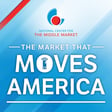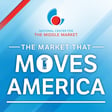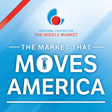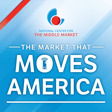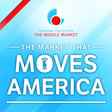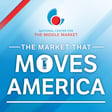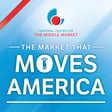Introduction to the Podcast and Episode
00:00:04
Speaker
Welcome to The Market That Moves America, a podcast from the National Center for the Middle Market. The center is the leading source of knowledge, leadership and innovative research on the middle market economy. Throughout our podcast, we will feature middle market leaders and stakeholders to hear their real world perspectives on trends and emerging issues.
Exploring Talent, Technology, and Risk in Middle Market Companies
00:00:25
Speaker
For 13 years, the National Center for the Middle Market has been at the forefront of studying and serving middle market companies. During that time, we've had the opportunity to explore many topics, specifically focused on growth and capabilities. Our latest research project, in collaboration with Aion, takes a closer look at three important areas, talent, technology, and risk. In this episode of The Market That Moves America, we'll talk in more details with a senior leader at Aion about these areas.
00:00:56
Speaker
Welcome to The Market That Moves America. My name is Doug Farin, Managing Director of the National Center for the Middle Market, located at The Ohio State University Fisher College of Business.
Guest Introduction and Middle Market Growth Drivers
00:01:07
Speaker
Today's episode is a discussion with Lori Goldterman, a AON CEO, Regions North America and Enterprise Clients.
00:01:15
Speaker
and NCMM and Aion recently collaborated on a study to explore growth drivers at middle market companies. And in this episode, we're going to talk about the middle market and specifically how human capital, risk management, and technology play a critical role in how these organizations scale. Lori, welcome to the podcast. Thank you so much, Doug. It's great to be here.
00:01:37
Speaker
So first of all, can you tell us a little bit about your background and career at Aeon as well as ah your focus and priorities in in the current role that you have? Sure. I've been at Aeon now 31 years, if you can believe that.
00:01:53
Speaker
And at the heart of my role has always been serving middle market companies. And when I think about this ah wonderful study that we did with the National Center for the Middle Market, this really is our largest customer base at Aion. The middle market is fueling that exceptional growth. The study covered that $10 million to $1 billion dollars in sales of companies that make up about a third of the private sector GDP and almost 50 million Americans. So we're really excited about releasing this study with Ohio State University.
Aion's Approach to Decision Making and Strategy Support
00:02:29
Speaker
Yeah, wonderful. You just you kind of touched on some of the things in my next question, but why are why are do you think some of the other reasons why middle market companies are so important, particularly to Aeon? Are there certain things that you see that they need or challenges that they face that are really unique to the their size?
00:02:49
Speaker
You know, Doug, it's a great question. When we think about the middle market, we've got this longstanding commitment to the segment. And it's really breaks down to about three core reasons. First would be the middle market companies really face unique challenges that differ from the large multinationals. And they often don't have that professional risk manager that wakes up every day and worries about things like cyber and supply chain risk. So Aeon can step into the shoes of that extension of their risk and people strategy.
00:03:19
Speaker
and really bring solutions to their C-suite. Probably the second one would be just the economic impact of this segment. There is a substantial portion of the North America business contributing so much to jobs and our economic development. So by serving that middle market segment, we really feel we're playing a ah key role in providing that economic stability and and growth of these middle market companies.
00:03:43
Speaker
And the third and probably most fun is how agile and innovative this segment is. they They are looking for, how can we bring them smart bundled solutions that help de-risk their growth strategy and and help them strengthen their people strategy. They're using our data and analytics to make that decision. And I think there's some wonderful insights coming out of this report that will really help them navigate some of the challenges that they're facing today.
00:04:11
Speaker
Right? Yeah, absolutely. So there's a great line that I saw. Aeon says that they are in the business of better decisions. Can you explain a little bit more about what that means? And especially, as some of the points you just touched on about the needs of of middle market challenge, ah middle market companies, we know they have very unique challenges and needs. So I'd love you to to hear you talk about that a little bit more.
00:04:36
Speaker
Yeah, so thank you so much, Doug, for that. And when we think about it, Aion, how do we help them make better decisions to protect their business, to grow their business? And we really break it down in probably three ways. The first would be bringing them, excuse me, analytic capabilities to unlock those insights so they can make better and more informed decisions. And if you think about where we are right now, the hurricanes that we're facing, we're using tools like Impact On Demand to help our clients understand What are the natural catastrophe exposures for the assets and the people where they sit today? And how can these tools also look into the future and take a look at things like climate change and how will they drive impact to protect their people and maybe even where they spend their capex or seek M and&A opportunities? So clients today are really looking for more analytic tools to make those decisions.
00:05:31
Speaker
And I think the second thing would be our integrated structure to help them make those better decisions. We break that down into two categories, risk capital and human capital. So when you think about something like human capital, for any one of our middle market companies to build their talent strategy, their people strategy, having that integrated structure of health, wealth, talent together really brings them a total end-to-end solution to attract and retain talent, which is one of their greatest pain points today. And then the last I would say is we deliver it local. Middle market companies, it's really important that you can sit across the table from these middle market companies and serve their business as an extension of their team, but do that through the lens of having the global expertise behind them every step of the way. so
00:06:22
Speaker
These would be some of the ways that AM helps them make those better decisions around the risk and people strategies in middle market. Yeah, I can totally echo that last point because as we publish a lot of data around the US middle market, it particularly becomes important when we travel into different cities and towns and meet with
Research Insights on Growth Drivers
00:06:44
Speaker
groups. I mean, they always want to know, yeah what does it mean for for me here in my in my local or regional area? So could not agree more.
00:06:52
Speaker
um I can speak on behalf of the and and NCMM that we were thrilled to partner with Aion on this project. But ah why did Aion choose to so to collaborate with the National Center for the Middle Market? And what were some of the goals and objectives as we thought about this project looking at growth in in middle market companies? Well, we're really excited to release our report with the National Center for Middle Market.
00:07:17
Speaker
And Anne has a saying of the voice of the client and everything we do is informed by the voice of the client and how do we meet their needs. And with the middle market being the fastest growing segment in North America, I think the center has done a phenomenal job.
00:07:32
Speaker
and bringing that data to the space and help those businesses make better, more informed decisions. So we have that shared interest with the NCMM and um fostering the growth of the middle market sector. And the study uncovered some really key drivers of what makes the middle market company successful. What's important to their talent base in terms of total rewards?
00:07:54
Speaker
and the key risk drivers. And it focused on companies in ah in a couple of different segments, including the ones that are growing the fastest, 20% or more. And what have they done differently? How have they faced the challenges in areas like cybersecurity, their AI strategies?
00:08:11
Speaker
so I really love the report and all the findings that come from these companies we surveyed in such a broad spectrum. so it It was a great partnership and we're excited to use it with our clients.
00:08:27
Speaker
That's great. so So let's get into the report. um It is now out. It was recently released. It's published. the The name of the report is growth drivers the role of people risk and technology in middle market success. You just kind of touched briefly on some of those key findings but.
00:08:45
Speaker
Let's focus specifically on high-growth organizations. And and maybe, Laurie, you can talk a little bit about what other companies who read this study can learn about how high-growth companies might differentiate from their peers. You know, Doug, I think the report does a great job going into some of the highest areas that that we saw a trend around people, risk management, and technology.
00:09:12
Speaker
In the people area, the secret sauce of a high growth mid-sized companies are absolutely pointing to 90% of their secret sauce would be in their talent strategies alone. And there's a lot of data in the report.
00:09:27
Speaker
that really identifies what's important to that talent base, what's it going to take to find them, to retain them. And when you're structuring something like the total reward strategy, the different generations in the workforce today are looking for different things. So how can you actually build that strategy across health, wealth, and talent to be the most successful that you can?
00:09:48
Speaker
The second category is in the area of risk management. And it's interesting, October is actually Cyber Security Awareness Month. So the notable trends in the report and the largest identified challenges for middle market companies, especially the ones that are growing incredibly fast, cyber is a huge area of risk. And the report does a great job going deep in that area.
00:10:12
Speaker
And the third would be just technology in general. The rise of artificial intelligence brings both opportunity in places like efficiency, but also opens up the door for tremendous risk and also rescaling employees. Do they really have the right talent?
00:10:29
Speaker
that has the AI depth and background to meet their strategy.
Addressing Talent Retention and Work Arrangements
00:10:33
Speaker
and If you think about you know companies in the financial services sector, they're using AI to actually drive investment strategies for their customers. That's very different from life sciences companies that are literally using AI to accelerate research and development and go from that R and&D lab to shelves and and curing many, many quality of care issues for us. So people, risk management and technology are the three areas that that you're gonna see some great depth in this report.
00:11:04
Speaker
Yeah, that's a great recap of those key findings. And I want to kind of go into some of those in more particular depth. So let's start with the the human capital piece. I think one of the really interesting insights from the study is that while you mentioned that particularly in these high growth companies, the workforce can be a differentiator, but it also increases some new risks.
00:11:29
Speaker
Can you talk about those distinctions? Essentially, how can that coexist within a middle market company where you're looking at your talent and your people? You're saying this is our secret sauce, but yet there's also some specific things we have to manage around that talent. Can you tell us a little bit more about that?
00:11:48
Speaker
Yeah, I think today, you know especially coming out of of COVID, um the war on talent is is certainly real and and the high growth companies, 90% again, say that they are are tied to twice as likely to say it's their talent that really is the differentiator. So when you think about total rewards, to maintain competitive ah rewards packages, you have to look at things like mental health, retirement plans, pay transparency and equity. And the report itself goes through the three categories of lower growth companies, mid-growth, high growth companies, and evaluates things like work-life balance and pay compensation, health and benefits,
00:12:37
Speaker
what which of those are more important to your employees to be able to attract and retain them? And what was interesting to me is flexible work was valued above wellness, which which really surprised me. I think everyone's still trying to figure out how to have flexibility and agility, but also maintain culture and career development. And a lot of that has to be done in the office. So as as you're sitting down as the chief people officer building your talent strategy,
00:13:06
Speaker
I think it's critical to understand what is important to your employees and it's much more complicated today than just building the health and benefits program. So we have something today on called the benefits assessment tool and it helps sit down with each of our clients and understand what is the most efficient, cost-effective way to build a benefit program, but how can we identify savings in the benefit program to reinvest them in other areas? So I think it's much more complicated today, Doug, and people are at the at the heart of the success of these middle market companies. So I think the report gives tremendous insight and in the people category.
00:13:48
Speaker
yeah So in other words, the risks are really if if you don't understand what your what your people really want and need and prioritize, then you run the risk of losing those people. Is that fair to say?
00:14:00
Speaker
Yeah, there's no question. And I think you can't assume if you have five generations in the workforce, they don't all want the same thing. Sure. um Are you really spending the dollar for your health and benefits for their retirement and the compensation and their pay? Are you spending
Cybersecurity Threats and Preparedness
00:14:17
Speaker
in the right area? I think that's a much more complicated strategy today. And many times we say the chief people officer is the head of the talent supply chain.
00:14:27
Speaker
um it's It's much more complicated and I'm excited to share the results of this study. I think it brings tremendous insight to the people strategy. let's um let Now let's talk about the technology area. So the NCMM started looking at really digital transformation in the middle market as far back as 2019. And as these companies start to undergo the implementation of you know all different types of of tools, we start to see cybersecurity becoming more of an issue. You just mentioned we're in cybersecurity month here in October right now. But it's interesting that in our research, this this new study, this was not identified as the number one
00:15:12
Speaker
risks that middle market companies face. Does that kind of align with what you're seeing with with your clients at Aion? And why do you think this is such a big issue for them? Well, it's it's a huge issue. And I think as companies are undergoing digital transformation, and that is really going to continue, Doug, there's no question about people building their strategy around how do I get closer to my customer? How do I use digital transformation to be more efficient. Or as we talked about earlier, some of the industries, it's it's literally fundamental to their strategy. And around the world, cybersecurity remains the number one risk category
00:15:55
Speaker
no matter what size company you are and and no matter what industry. So it's not surprising to me to see in the NCMM report with Aion that cyber remains one of the highest threats to middle market companies. And what really jumped out at me is that a staggering 70% of the high growth companies have experienced a cybersecurity breach.
00:16:18
Speaker
So as these companies digitize their operation, they become increasingly attractive targets for cyber attacks and exposing them to heightened risk and compromise that sensitive date and disrupt business activities, but also be a real threat to brand and reputation.
00:16:34
Speaker
um What I found really interesting as well is after a cyber breach, 51% of these companies pursued having a potential risk management role. um So we do something called the site queue assessment, and it's part of our core service to middle market companies.
00:16:52
Speaker
And it helps give companies a baseline of how well are you protected? What is your cyber resilience? But I can't stress enough, the report goes deep into this area. And I think we all have to get on our front foot when it comes to protecting our firms around cyber. And that's only going to increase, Doug, with artificial intelligence and generative AI becoming part of everybody's strategy.
00:17:18
Speaker
So do you do you think for so as middle market leaders, do you think it's more that they maybe underestimate the cyber threats that they face or do they overestimate their own preparedness or is it a combination of both of those two?
00:17:32
Speaker
you know I don't think the middle market is is unique in this area. I think cyber attacks are up, ransomware attacks are up. The difference might be the level of staff that exists in a middle market company to drive that resilience. so you know I see risk management as a differentiator of competition and an advantage. And and what i what I would urge companies in the middle market space is to not wait until a cyber breach happens to challenge how deep we need to go into risk mitigation. um I think the attacks ah and threats are are real, Doug. And
Enterprise Risk Management and AI Implementation
00:18:15
Speaker
so how can how can we leverage and help these middle market companies to be proactive
00:18:20
Speaker
and and build the most resilient wall that we can um because they they are no different from any other size company or industry. um But I don't see those threats getting any less as we move forward. So I think it's got to be ah ah highest priority for the C-suite of the middle market companies. Yep, certainly. So that's a great segue into my next question that we also looked at in the study, which was but more broadly the topic of of risk management.
00:18:53
Speaker
So you mentioned that this issue around resources, but are there other things that maybe middle market companies need to do better as they're assessing their vulnerabilities or the types of investments that they're making to make sure that not only their data, but their people, their physical assets, they have comprehensive protection of all the things that really are most important to their business?
00:19:18
Speaker
Yeah, I think the first thing would be um a real focus on assessing the risk and and taking advantage of whatever tools are available. Certainly, the PsyQ assessment that that we have at Aion is one of the strong tools that we have. Many of the insurance companies have have these tools. I think taking an advantage of what's available and and then doug looking at it through the lens of industry. I think industry has some very unique challenges when it comes to cybersecurity. So what can our middle market companies learn from protecting themselves against these threats? There's there's a lot that's available out there and I think our
00:19:58
Speaker
our study that we're publishing gives great insight to where some of these threats can occur. But having that focus on a true risk management strategy and enterprise strategy for the middle market companies is something that I would encourage middle market companies to get a bit more formal about and structured. I think it'll be money well spent and we'll give them a competitive advantage to protect their business.
00:20:26
Speaker
So artificial intelligence was another area that we wanted to explore as part of this research. And it's such a hot topic. But as I travel around the country, I mean, certainly talking to middle market companies, they see it as as an opportunity. But perhaps it's a little bit complex. It's a little ambiguous, not sure where to start, all types of questions. But yet this study again kind of verified that the fastest growing companies are more rapidly adopting the the benefits of AI. They're embedding it in their business and they're making it an essential part of their operation. So how do you see the promise of this new technology, but also maybe some of the risks and pitfalls
00:21:13
Speaker
of AI playing out across the middle market and say the next year or two. Yeah, it's it's artificial intelligence, Doug, as you know, is just going to be a topic that we're all talking about. um Well, well into the future. And I think it gives the middle market companies kind of three areas, efficiency, growth, acceleration,
00:21:34
Speaker
and innovation and over half the firms in the study particularly the high-growth ones have made significant headway in adopting AI and presenting a new era of optimized efficiency and that enhanced risk management capabilities they've improved their offerings and found ways to reduce cost and they've also used it in their talent strategy.
00:21:56
Speaker
So as AI becomes more pervasive in the system, it it definitely prevents new challenges. There's privacy concerns, also making sure the algorithms used in the talent strategy does not bring a bias into the equation. You want to make sure that you have those security challenges well protected. so we We have to walk that delicate tightrope between innovation and caution, ensuring that AI is implemented responsibly, upheld by transparency and ethical standards, and rigorous data privacy measures. And I think we're still early days. um Regulations on this, kind of like cyber, um can be state-specific.
00:22:36
Speaker
Globally, it's very different, so I think we're in the the early days of really understanding what the guardrails are on AI and exactly what all the risks are, but there's no question every single company is looking at it for how can I find more efficiency, how can I use it to accelerate growth, and certainly around innovation.
00:22:56
Speaker
Are there any resources, Lori, that you're aware of that middle market companies can use as they kind of dip their toe into this or start their journey? Because again, I think there is broad recognition of the opportunities as you just define them. But oftentimes what we hear here at the center is, I just don't know where to start. Or for my particular industry, AI has you know a specific application or you know like logical area as a starting point. where like Where would a middle market company go to learn more about um you know what they can do? Is it is it industry peers? Is it you know other types of resources?
00:23:36
Speaker
Yeah, it's a great question. what What we're doing actually, and I do think it's industry-specific, Doug, because if you're sitting down with you know a bank, a life sciences company, it's very different from a retailer or you know a real estate firm, right? And so what we're doing at Aion is we're having workshops around this that we bring in two teams. One that is on the people org side, and the second is on the risk management side. So we're sitting down and saying,
00:24:05
Speaker
What talent strategy do you need? And the word that I keep hearing is reskilling, reskilling the employees. I ah need to actually um change the skill set of a portion of my population so that AI is actually part of the skill set to meet our strategy. And so we have a team on our on our talent business that is very specific to industry that can have that people org AI workshop And then the second side is really leveraging a lot of the talent that we have on the cyber side and the contracts team. where There's a lot of AI risk that I'm seeing embedded in contracts. So how do we sit down and actually evaluate how the middle market company is bringing AI into their strategy?
00:24:49
Speaker
What is covered? What's the new risk factor? And what risk mitigation strategies is that middle market company putting in place? So that's ah really the starting point. I would say, Doug, companies are still trying to figure this out. And the tech companies without question are bringing those capabilities to the middle market companies. But we we love to work alongside of them in that kind of workshop mentality.
00:25:15
Speaker
But these are early days. I would just encourage middle market companies not to overlook the step of bringing in those outside consultants to help them navigate the path together.
Holistic Strategies for Middle Market Leaders
00:25:27
Speaker
great Great advice. So we've covered a lot of ground. I've just got kind of one wrap up question for for our discussion. And that would be, if a middle market leader is is listening to this episode or they have a chance to read the report or they're looking at some of the insights and takeaways,
00:25:45
Speaker
What advice would you give them just about their own people, risk management and technology, how they should view it? Any tips or advice you would give them as ah as a takeaway? Yeah, Doug, the first thing I would say is to middle market leaders and companies adopt a holistic strategy to tackle these challenges with your workforce, with risk management and technology. Those are kind of the three big categories that our report will give great insight around.
00:26:14
Speaker
and start to prioritize the engagement of your people. If you think about ensuring that your benefit package address the unique needs of your workforce, invest in learning about the opportunities in colleague development and recognize the contributions they're making to growth. Take care of your people with purpose is taking care of your organization.
00:26:33
Speaker
And when you get to assessing the risks specific to your industry like supply chain vulnerabilities, regulatory shift, and developing contingency plans, purposely introduce technology to enhance that operational efficiency and foster innovation, implementing those robust cybersecurity measures tailored to your company and while fostering a culture of transparency and accountability. And last, I would just say leaders can position their organizations for long-term success in this ever evolving business landscape.
00:27:05
Speaker
It includes a nurturing a strong company culture of continuous learning, open communication and staying informed about the industry trends. And we really hope this report developed jointly with the National Center for Middle Market brings insight to this strategy. So we're looking forward
Conclusion and Subscription Information
00:27:22
Speaker
to releasing it and having those client conversations.
00:27:26
Speaker
Well, fantastic. This has been a great discussion. I truly appreciate your not only your time, but the wonderful insights that you've added and and commentary around the the report itself. and And again, just want to thank you for for being a guest on the podcast.
00:27:43
Speaker
Doug, I can't thank you enough and I'm excited to see where this goes for both of us. Exciting times and a ah great partnership. ah Great. Yeah, I completely agree. So that concludes our episode today. For more information about Aeon and about Lori, you can visit their website, which is aeon.com. Thanks and we'll talk again soon.
00:28:06
Speaker
Thank you for listening to The Market That Moves America. Never miss a new episode by subscribing anywhere podcasts can be found. You can also subscribe to our email newsletter at middlemarketcenter dot.org.

